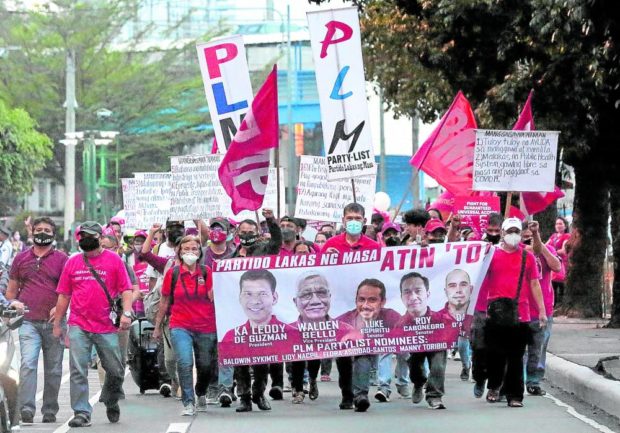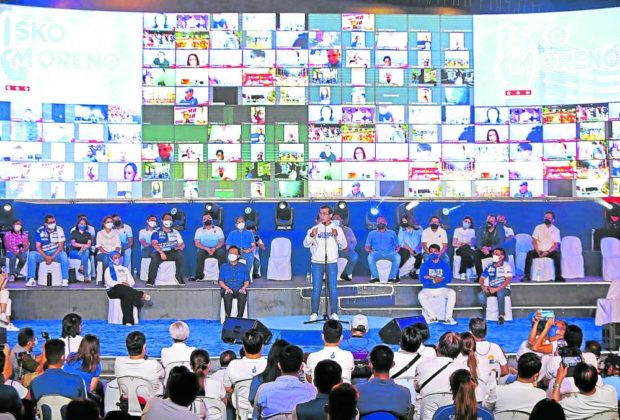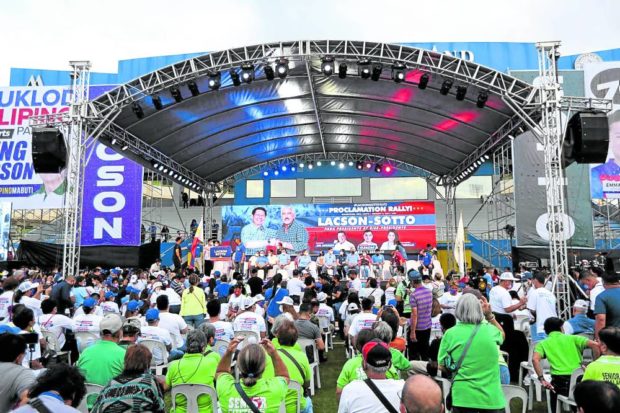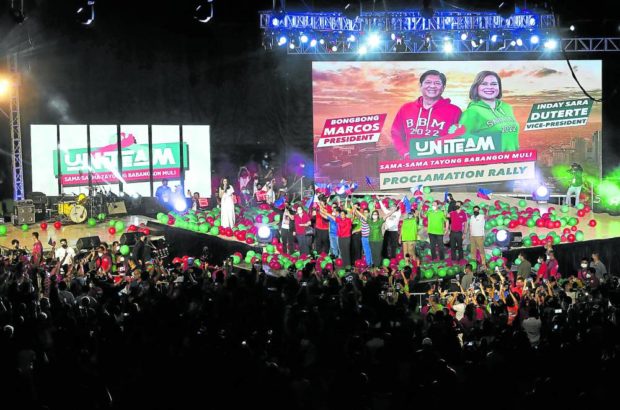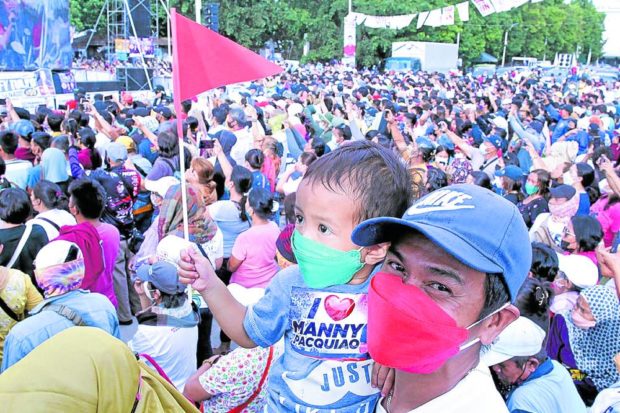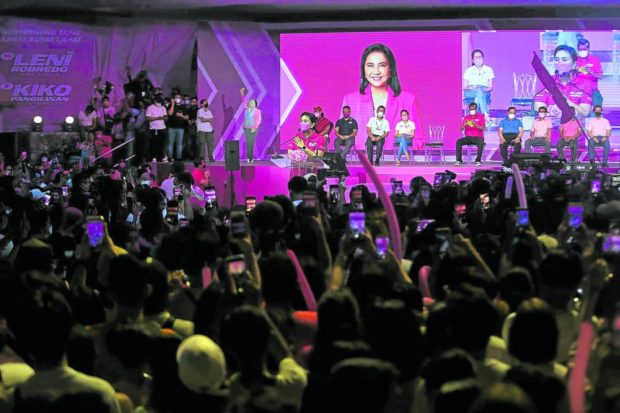Campaign Day 1: Comelec flags Ka Leody
MANILA, Philippines — Labor leader and presidential candidate Leody de Guzman risked possible disqualification for the “election offense” of physically campaigning without a permit from the Commission on Elections (Comelec).
De Guzman did not apply for a permit from the regional Comelec campaign committee (CCC) in Metro Manila for any mode of in-person campaign, including his proclamation rally at the Bantayog ng mga Bayani monument on Edsa, Quezon City, on Tuesday evening, according to the Comelec.
“Definitely, it is an election offense because the requirement is they need to seek a permit first before conducting a campaign,” Comelec education and information chief Elaiza David said in a press briefing on Tuesday afternoon.
“We’re not talking about whether the venue is free or not. What we are trying to regulate is the conduct of campaigns. They still need to ask for a permit and they should apply with the specific CCC,” she said.
Citing a report from the CCCs in Metro Manila and in Central Luzon, David said that as of Tuesday—the official start of the campaign period for national candidates—only four of the 10 presidential candidates had applied for a permit to hold in-person sorties in the capital region.
Article continues after this advertisementThey are Vice President Leni Robredo, former Sen. Ferdinand Marcos Jr., Manila Mayor Francisco “Isko Moreno” Domagoso and Sen. Panfilo Lacson, with running mate Senate President Tito Sotto.
Article continues after this advertisementThe campaign committee, chaired by the election director in the area with counterparts from the health and interior departments, the police and the military as members, has disallowed a planned sortie of Robredo due to incomplete documents and a planned motorcade of Domagoso due to late filing, David said.
Both activities were to be held in Metro Manila.
71 permits
David said that as of Feb. 8, 71 permits had been filed by presidential candidates for the same number of campaign activities nationwide.
Of the 15 regions, only Metro Manila and Central Luzon reported who had filed for permits or how many had been approved.
Under its pandemic campaign rules, the Comelec requires all candidates to get prior approval from CCCs at the regional, provincial and city or municipal levels at least 72 hours before holding in-person campaign activities.
Even campaign volunteers have to seek permits for in-person campaign activities involving mass gatherings, David said.
“These rules were promulgated … for the general welfare of the public, the candidates and the voters. We are trying to prevent the spread of the pandemic,” she said. “We are trying to limit the conduct of [in-person] campaigns. That is why we made the application a requirement.”
Face shields
Comelec spokesperson James Jimenez said the poll body may review its requirement on the use of face shields, which was largely ignored on the first day of the official campaign period.
The use of face shields “remains a crucial cornerstone of minimum public health protocols. Subject to the ruling of the CCC, we have to make an announcement later on for those minor infractions we see now,” said Jimenez.
He said that pending the poll body’s decision, “the guidance remains: Use face mask and face shield” in campaign sorties.
Face shields are no longer required to be worn outdoors in areas under alert levels 1, 2 and 3 under Resolution 148-D dated Nov. 11, 2021, of the Inter-Agency Task Force for the Management of Emerging and Infectious Diseases.
But Comelec Resolution 10732 dated Nov. 24, 2021, on pandemic campaign rules requires face shields to be worn over face masks in all in-person campaign activities.
Jimenez said other “potential violations of election laws” seen on the first official campaign day was the lack of physical distancing in crowds and campaign posters outside designated areas.
Barangay officials, guards (“tanod”) and health emergency response team members are tasked by the Comelec to report campaign infractions within 72 hours after the activity.
Jimenez said reports of possible election offenses may be sent by email at [email protected] and Twitter using the #sumbongko hashtag.
He said all complaints and reports would go through “due process” primarily to assess whether the candidates themselves had knowingly violated Comelec rules.
‘Challenges’
The Philippine National Police chief, Gen. Dionardo Carlos, admitted “challenges” in enforcing the Comelec guidelines, such as Resolution No. 10732.
The PNP’s primary concern during the campaign period is to ensure that those attending mass gatherings are following health protocols, including physical distancing and the proper wearing of face masks.
Carlos said PNP teams included health personnel to make sure that campaign activities were compliant with the protocols.
“We are looking for solutions to these problems so that we can properly do our job of securing the campaign. This is the new normal, and we will work with the new normal,” he told CNN Philippines.
Carlos said the PNP had held two command conferences with the Comelec and the military. The latest was held on Monday, and another is set on Feb. 16.
The discussion will center on logistics, manpower, mobility and the communication system utilized by PNP personnel in providing security for the candidates, he said.
Standard package
The PNP has deployed a “standard security package” for the candidates, Carlos said.
“We will all treat them equally,” he said. “We will deploy security teams. If they make the early arrangements or coordination, we look at the site, we look at the movement of the candidates and the activity to make sure the conduct of the campaign will be safe for everybody.”
But Carlos pointed out that the PNP could only provide security assistance as the candidates’ respective campaign teams were primarily responsible in ensuring that their activities would not violate the Comelec rules.
Comelec Resolution No. 10732 lists the activities barred during the campaign period, many of which were considered customary in prepandemic elections.
Among others, handshakes, hugs, kisses, going arm-in-arm, or any physical contact among the candidates, their companions, and the public are prohibited.
Take the lead
Also not allowed are taking selfies and similar activities requiring close proximity between the candidates and their companions, and the distribution of food and drinks and other items.
On radio, Health Secretary Francisco Duque III urged the candidates to take the lead in complying with public health standards to prevent turning their campaign activities into superspreader events.
“I am appealing to the candidates to initiate order in their campaign rallies. Lead your supporters in observing health and safety protocols. Observe physical distancing, wear face masks, do frequent hand-washing and sanitation,” Duque said.
“[The candidates] should be able to convey the message that they are concerned [about] the health of the people,” he said.
—WITH A REPORT FROM TINA G. SANTOS
RELATED STORIES
Ka Leody De Guzman, Walden Bello push through with proclamation rally
